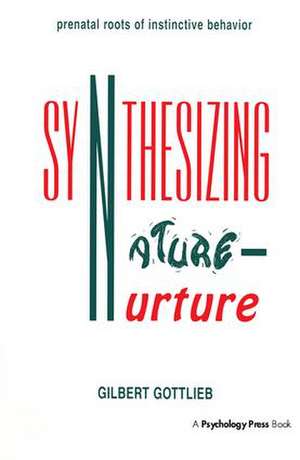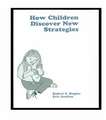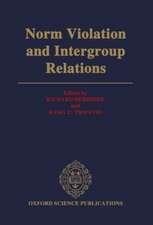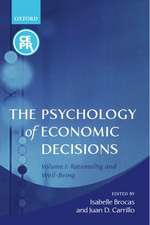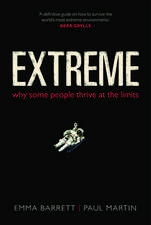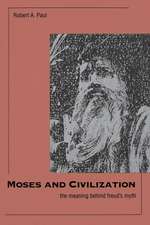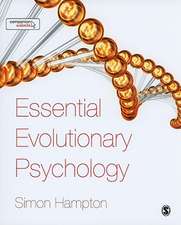Synthesizing Nature-nurture: Prenatal Roots of Instinctive Behavior: Distinguished Lecture Series
Autor Gilbert Gottlieben Limba Engleză Hardback – mar 1997
Preț: 1002.02 lei
Preț vechi: 1221.97 lei
-18% Nou
Puncte Express: 1503
Preț estimativ în valută:
191.74€ • 201.11$ • 159.62£
191.74€ • 201.11$ • 159.62£
Carte tipărită la comandă
Livrare economică 01-15 aprilie
Preluare comenzi: 021 569.72.76
Specificații
ISBN-13: 9780805825480
ISBN-10: 0805825487
Pagini: 204
Ilustrații: Illustrations, ports.
Dimensiuni: 152 x 229 x 18 mm
Greutate: 0.5 kg
Ediția:1
Editura: Taylor & Francis
Colecția Psychology Press
Seria Distinguished Lecture Series
Locul publicării:Oxford, United Kingdom
ISBN-10: 0805825487
Pagini: 204
Ilustrații: Illustrations, ports.
Dimensiuni: 152 x 229 x 18 mm
Greutate: 0.5 kg
Ediția:1
Editura: Taylor & Francis
Colecția Psychology Press
Seria Distinguished Lecture Series
Locul publicării:Oxford, United Kingdom
Public țintă
ProfessionalCuprins
Contents: Series Preface. Preface. Formulating Probabilistic Epigenesis. Preliminaries to an Explicit Experimental Demonstration of Probabilistic Epigenesis. Experimental Demonstration of Probabilistic Epigenesis (in Two Parts). Perceptual Capabilities of Mallard Duck Embryos: Clarifying the Role of Experience. Experimental Demonstration of Probabilistic Epigenesis in Wood Ducklings. Experiential Canalization of Species-Specific Behavior. Modifiability of Species-Specific Behavior. Evolution of Probabilistic Epigenesis: History and Current Status of a Developmental-Psychobiological Systems Viewpoint. Toward a New Developmental and Evolutionary Synthesis.
Recenzii
"...Gottlieb succeeds brilliantly in this book in describing in personal terms how discovery depends on keen observation and creative application of methods that continually refocus and refine the phenomena under inquiry. But it is also a book that puts one individual's research in the richer context of the ideas and studies of Gottlieb's historical predecessors. In this way, Gottlieb not only personally recounts a fascinating series of scientific investigations, but also carefully describes the succession of scientific beliefs that now make it possible to go beyond the modern synthesis."
—Contemporary Psychology
"This is an erudite book written by a leading developmental psychologist with an encyclopaedic knowledge of the relevant fields. Gottlieb's appreciation of the historical foundations of behavioural embryology and its close cousin developmental psychobiology is impressive....Synthesizing Nature-Nurture is a challenging piece of writing. It not only challenges molecular biology's hold on research into the origins and timing of development, but also will be challenging reading material for undergraduate courses in developmental psychology. It could be recommended for advanced undergraduates if accompanied by a knowledgeable and questioning form of tutorial guidance."
—British Journal of Developmental Psychology
"...a delightful combination of autobiographical detail and developmental science....Gottlieb's synthesis between nature and nurture is to be commended, not only because he lays down important principles for contemporary developmental science but also for his enthusiastic personal account of a lifetime's scientific creativity."
—The Psychologist
"In this new book, Gilbert Gottlieb, a comparative and developmental scientist of unparalleled theoretical sophistication and empirical accomplishment, turns his singularly creative attention to an analysis of the concept of probabilistic epigenesis. The result is a book that makes a unique and invaluable contribution to an integrated understanding of developmental systems, evolution, and plasticity. This superb volume is a watershed event in scholarship pertinent to the biological and contextual bases of development and is a necessary resource for all scholars concerned with the process of development."
—Richard M. Lerner
Tufts University
"In contrast to the current consensus that believes biological science has nothing more to learn, Gottlieb's astonishing new book opens wide the door to a new 'developmental' view of the relationship between genes and early experiences, opening up the evolution of the mind--in the womb and during childhood--to the possibility of greatly improving what we mislabel 'human nature'."
—Lloyd deMause
Editor, The Journal of Psychohistory and Director, The Institute
—Contemporary Psychology
"This is an erudite book written by a leading developmental psychologist with an encyclopaedic knowledge of the relevant fields. Gottlieb's appreciation of the historical foundations of behavioural embryology and its close cousin developmental psychobiology is impressive....Synthesizing Nature-Nurture is a challenging piece of writing. It not only challenges molecular biology's hold on research into the origins and timing of development, but also will be challenging reading material for undergraduate courses in developmental psychology. It could be recommended for advanced undergraduates if accompanied by a knowledgeable and questioning form of tutorial guidance."
—British Journal of Developmental Psychology
"...a delightful combination of autobiographical detail and developmental science....Gottlieb's synthesis between nature and nurture is to be commended, not only because he lays down important principles for contemporary developmental science but also for his enthusiastic personal account of a lifetime's scientific creativity."
—The Psychologist
"In this new book, Gilbert Gottlieb, a comparative and developmental scientist of unparalleled theoretical sophistication and empirical accomplishment, turns his singularly creative attention to an analysis of the concept of probabilistic epigenesis. The result is a book that makes a unique and invaluable contribution to an integrated understanding of developmental systems, evolution, and plasticity. This superb volume is a watershed event in scholarship pertinent to the biological and contextual bases of development and is a necessary resource for all scholars concerned with the process of development."
—Richard M. Lerner
Tufts University
"In contrast to the current consensus that believes biological science has nothing more to learn, Gottlieb's astonishing new book opens wide the door to a new 'developmental' view of the relationship between genes and early experiences, opening up the evolution of the mind--in the womb and during childhood--to the possibility of greatly improving what we mislabel 'human nature'."
—Lloyd deMause
Editor, The Journal of Psychohistory and Director, The Institute
Notă biografică
University of North Carolina, Chapel Hill.
